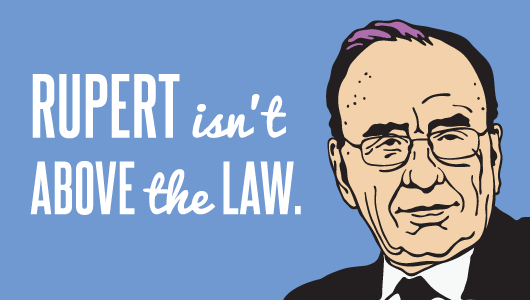
How Will Murdoch's U.K. Implosion Be Felt in the U.S.?
A scathing report in Britain that Rupert Murdoch and other News Corp. executives engaged in an extensive cover-up of “rampant law breaking” may have ramifications for the media mogul in the United States.
How far-reaching those consequences are depends on U.S. politicians’ willingness to face down one of the most powerful media figures of our generation.

A U.K. investigation concluded that Murdoch is "unfit" to run an international company.
But chinks in Murdoch’s armor have deepened since Tuesday, when a U.K. government investigation found that News Corp. executives hacked private phone messages, bribed government officials and then sought to conceal this wrongdoing, in part by giving misleading testimony to British law enforcement and Parliament.
The investigation, conducted by the House of Commons Culture, Media and Sport Select Committee, concluded that News Corp.'s media empire is so corrupt that Murdoch is “not fit to run an international company.”
The report leaves in question Murdoch's bid to take a controlling share of Britain’s largest satellite TV firm, BSkyB, a deal requiring approval of the country’s media regulator Ofcom.
But Murdoch’s problems may extend well beyond British shores. This raises questions about whether News Corp. meets the minimum ethical standards required of broadcast license holders in the U.S., where the company controls 27 local TV stations among its consolidated media holdings.
When granting broadcast licenses, the Federal Communications Commission must determine whether applicants meet character qualifications in accordance with the Communications Act.
In making that judgment, the FCC is entitled to consider past conduct of media owners even if that conduct does not relate directly to their broadcasting interests, and may consider any pattern of misbehavior. The agency also is supposed to weigh whether the grantee serves the public interest. Broadcast licenses come up for review and renewal every eight years, but the FCC can revoke licenses at any time during that term.
Captive and Cowered
Unfortunately, the agency has a dismal record on renewals. The numbers tell the story: Over the FCC’s more than 75 years in existence, it has granted well over 100,000 broadcast license renewals while denying only four on the basis of failure to meet public interest obligations.
And while viewers regularly petition the agency to deny a broadcaster’s renewal on such grounds, you would have to go back more than 30 years to find the most recent instance in which the FCC responded by pulling a license.
The FCC’s oversight system “operates almost on auto-pilot to the benefit of current license holders,” writes Steve Waldman, the lead author of the 2011 FCC study “The Information Needs of Communities.” He attributes the dearth of FCC action against stations to commissioners who “no doubt feared denying licenses would trigger contentious battles with broadcasters.”
And no broadcaster more aggressively pushes back against government oversight than News Corp., which has spent more than $61 million to lobby Washington and another $8.1 million on campaign contributions.
It’s a way to buy influence among elected officials that has paid handsome dividends for the American company.
On Tuesday, MP Tom Watson singled out Murdoch for overseeing a culture of corruption that has spread through News Corp. "More than any individual alive, he’s to blame,” he said. “Morally, the deeds are his. He paid the piper, and he called the tune. It is his company, his culture, his people, his business, his failure, his lies, his crimes, the price of profits and his power."
Watson added that Rupert and his son James "lied and cheated, blackmailed and bullied. And we should all be ashamed when we think how we cowered before them for so long."
It’s an indictment of the Murdochs but also of Watson’s fellow politicians, which can be translated on this side of the Atlantic to a U.S. body politic that too often regards media moguls as above the law.
New York Times reporter David Carr has exposed a litany of offenses committed on U.S. soil by News Corp.; its subsidiary New America Marketing, to take just one example, hacked into competitors’ computers. In addition, News Corp. is alleged to have hacked into the phones of the families of 9/11 victims and to have violated the Foreign Corrupt Practices Act, which forbids the bribing of foreign officials to further a U.S. company’s business interests.
For these and other alleged crimes the company is already the subject of a Department of Justice investigation. But as the British Parliament has shown, Congress also has a role to play.
Parliamentary hearings in the U.K. exposed the duplicitous nature of News Corp. executives and the extreme lengths to which they would go to cover up crimes and mislead the public.
Congressional hearings in the U.S. could bring to light even more misdeeds by a company that thinks itself too big to fail — or be held accountable before the law.
UPDATE: On Wednesday, Politico reported that Sen. Jay Rockefeller has asked a British official "if there is evidence that the News Corp. phone-hacking scandal involved U.S. citizens or violated U.S. laws."
If you care about bringing Murdoch to justice, please consider a donation to the Free Press Action Fund.